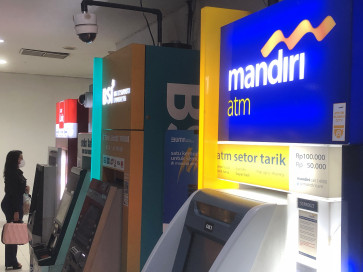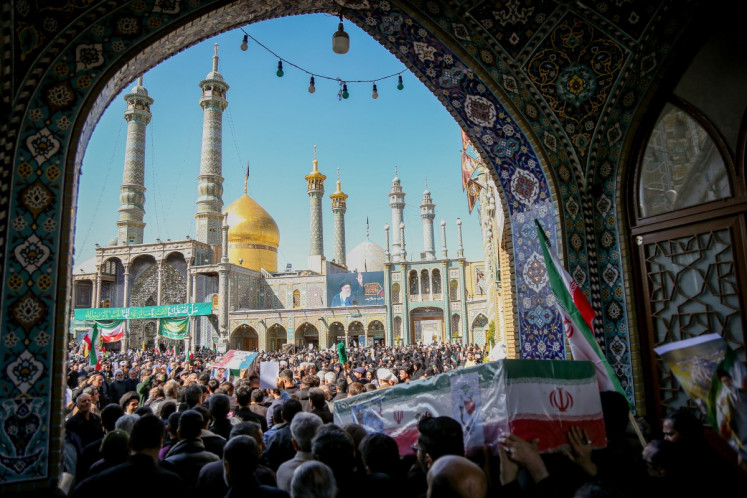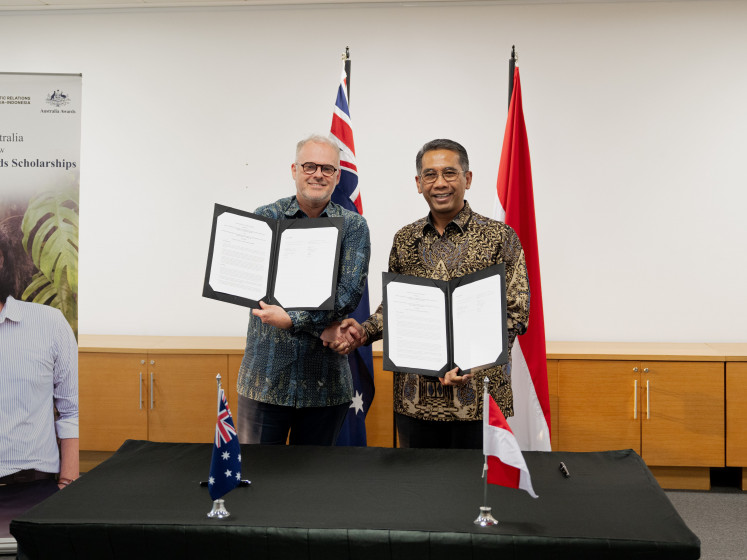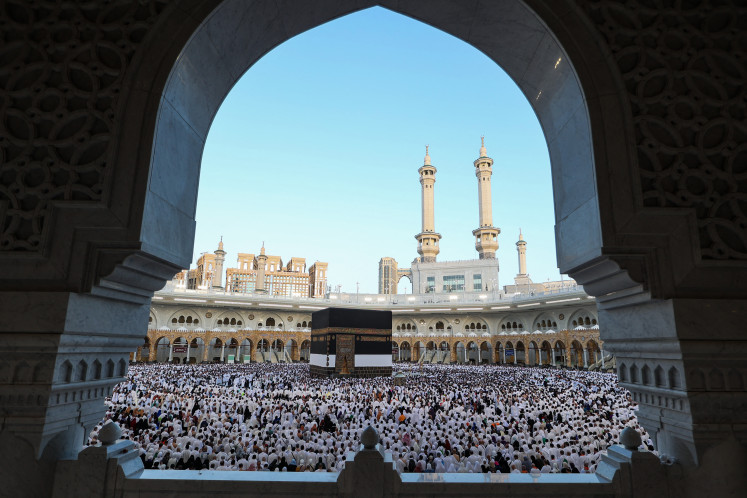Popular Reads
Top Results
Can't find what you're looking for?
View all search resultsPopular Reads
Top Results
Can't find what you're looking for?
View all search resultsJokowi 2.0 dreams big
At your service: President Joko “Jokowi” Widodo bows after delivering his inauguration speech in the Nusantara Building of the House of Representatives complex in Senayan, Central Jakarta, on Sunday
Change text size
Gift Premium Articles
to Anyone
A
t your service: President Joko “Jokowi” Widodo bows after delivering his inauguration speech in the Nusantara Building of the House of Representatives complex in Senayan, Central Jakarta, on Sunday.(JP/Dhoni Setiawan)
After taking the oath of office at the House of Representatives complex in Senayan, Central Jakarta, on Sunday, President Joko “Jokowi” Widodo stated in no uncertain terms that economic and bureaucratic reform would be the focus of his second term amid weakening global trade.
In his address before lawmakers, senators and world leaders who attended the ceremony, Jokowi stated that human development would be a major priority of his administration as it would help the nation reach its full
potential.
“Our dream is that by 2045, insya Allah [God willing], Indonesia will have escaped the middle-income trap. Indonesia will become an advanced country with an annual income of Rp 320 million [US$22,634] per capita or a monthly income of Rp 27 million per capita.
"Our dream is that by 2045, Indonesia's gross domestic product [GDP] will reach $7 trillion."
GDP per capita in Indonesia was last recorded at $4,284.70 in 2018, according to World Bank data compiled by Trading Economics. The national GDP stood at around $1 trillion.
To achieve this goal, Jokowi added that government bureaucracy needed to avoid becoming stuck in a “monotonous routine”.
“Oftentimes, bureaucrats report to me to say that a program has been carried out, that the budget has been spent, that the accountability report has been completed,” the President said. “But when I check in the field, when I ask the people, it turns out the public has not received the benefits [of the program].”
Jokowi emphasized that results were more important than the process, using the messaging app WhatsApp as an analogy.
“When we send a message through SMS or WhatsApp, there is 'sent' and there is 'delivered'. Our job is to guarantee [a program] is delivered, not just sent,” Jokowi said. “I don’t want a bureaucracy that just keeps sending things. I want and I will ensure a bureaucracy that delivers.”
Jokowi said his administration would carry out five initiatives during his second term: using an endowment fund to develop a dynamic and hardworking workforce, industry cooperation and technology; continuing infrastructure development; simplifying regulations by creating two omnibus laws — one on job creation and one on small business empowerment; simplifying bureaucracy by reducing the number of civil service echelons from four to two; and transforming the economy from one that is dependent on natural resources to one that is competitive in modern manufacturing and services.
He closed his speech by reciting a Bugis saying in honor of outgoing vice president and ethnic Bugis Jusuf Kalla.
“Pura babbara’ sompekku, pura tangkisi’ golikku,” he said. “My sail is flying, my helm is mounted. Together we move toward an advanced Indonesia!”
Jokowi also made another special mention, calling Gerindra Party chairman Prabowo Subianto and former Jakarta deputy governor Sandiaga Uno — who challenged the incumbent and Vice President Ma’ruf Amin in the 2019 presidential race — “my best friends”.

Hendri Satrio, a political observer from Paramadina University, said Jokowi’s inauguration address was “disappointing and worrying”, as it was only a repetition of his past Indonesian Vision speech.
“What worries me is the President didn’t talk about important issues, such as corruption eradication. He also didn't talk about his past innovations such as the mental revolution,” Hendri said.
Hendri added that in his next speeches, Jokowi needed to make clear to the public his positions on issues of public concern, as his inauguration speech was “not powerful enough”.
President Jokowi did not announce his new Cabinet on Sunday but promised he would “introduce” the Cabinet on Monday morning.
The ruling coalition expects him to make the announcement by Wednesday at the latest and anticipates a change in the lineup following the President's recent meetings with several leaders of opposition parties, namely the Gerindra Party, the Democratic Party and the National Mandate Party (PAN).
Indonesian Democratic Party of Struggle (PDI-P) executive Hendrawan Supratikno said the lineup had been completed but changes could still be made at the last minute.
"That's why we [coalition members] made a joke earlier today that we should not turn off our cellphones until 11 p.m. tonight," Hendrawan said on Sunday.
On the economic front, Jokowi will enter his second term with an economy that continues to struggle to expand by more than 5 percent annually, while the escalation of the United States-China trade war and the risk of a global recession could put further downward pressure on the economy.
“I think the speech was very good, but I think businesspeople won’t only look at the speech. From my experience, they will look at the implementation because oftentimes, what’s promised is not always in line with the realization,” said Center of Reform on Economics (CORE) Indonesia executive director Mohammad Faisal.
“Soon, we will see who his ministers are. If the chosen ministers reflect what’s promised in the speech, businesspeople will be more optimistic,” he added.

Following his inauguration, Jokowi would do well to focus on delivering his proposed structural reforms, namely cutting red tape to invite more foreign direct investment and boost exports, said British Chamber of Commerce (Britcham) Indonesia executive director Chris Wren.
“There is cautious optimism that they [the structural reforms] will have the desired effect,” said Wren. “There is a sense this can only happen with unfettered support from line ministries and more competent and loyal ministerial teams that are on the same page.”
The International Monetary Fund and the World Bank recently downgraded their growth forecasts for Indonesia to 5 percent this year, in line with the expected slowdown in global economic growth as downside risks materialize.
Adding to the bleak economic projection is the amendment of several laws, such as the Corruption Eradication Commission (KPK) Law in addition to the proposal to revise the Criminal Code Bill (KUHP). Such changes to the law could add to the compliance costs for businesses down the line, according to Fitch Solutions risk analyst for Asian country Koh Hui Koon.
“While these proposed legislative amendments do not have a significant direct impact on the business environment in Indonesia, they are indicative of a more conservative social climate in Indonesia,” Koh said in an email to the Post.
Kharishar Kahfi and Adrian Wail Akhlas in Jakarta contributed to the story










